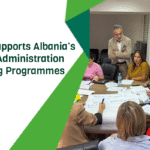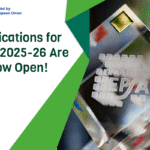Artificial Intelligence (AI) regulation is increasingly shaping industries and public services. Our recent EIPA event, “From Draft to Implementation: Preparing for the EU GPAI Codes of Practice,” provided an opportunity to discuss the future of AI regulation and safety in the European Union. The discussion took place the day after the release of the third draft of the Codes of Practice, making it a timely opportunity to unpack the purpose, process, and progress of these highly anticipated Codes.
 The EU GPAI Codes of Practice: A Critical Step for AI Safety
The EU GPAI Codes of Practice: A Critical Step for AI Safety
Currently under development, the Codes of Practice for General Purpose AI (GPAI) models are a critical instrument for ensuring AI providers comply with the new EU AI Act—a landmark regulation aimed at protecting fundamental rights through a risk-based approach to product safety regulation.
 Key insights from our expert panellists—Maria Oraiozili Koutsoupia, Member of the EU AI Board; Demetrius A. Floudas, International Lawyer and Policy Adviser; Lukas Adomavicius, Privacy Policy Analyst at the Centre for Information Policy Leadership (CIPL); and Michaela Sullivan-Paul, Senior Research Officer at EIPA—highlighted both the challenges and opportunities the Codes present for AI providers, public administrations, and end-users across Europe.
Key insights from our expert panellists—Maria Oraiozili Koutsoupia, Member of the EU AI Board; Demetrius A. Floudas, International Lawyer and Policy Adviser; Lukas Adomavicius, Privacy Policy Analyst at the Centre for Information Policy Leadership (CIPL); and Michaela Sullivan-Paul, Senior Research Officer at EIPA—highlighted both the challenges and opportunities the Codes present for AI providers, public administrations, and end-users across Europe.
Key Takeaways:
AI innovation remains strong in the EU: It was emphasised that regulation does not stifle innovation. On the contrary, AI innovation in the EU is thriving, and the Code of Practice represents a critical opportunity to ensure AI safety and ethical standards are maintained across the region. By providing clear guidelines, the Codes will help build trust in AI technologies, paving the way for more widespread adoption and innovation.
Broad benefits for all stakeholders: The Codes of Practice are not just for AI providers; everyone stands to benefit from their success. From downstream AI providers to end-users and the public sector, the success of these Codes will enable responsible AI adoption that enhances public services, boosts innovation, and safeguards fundamental rights.
Capacity building in the public sector: Panellists also stressed the importance of public administrations investing in AI literacy and capacity building to enable AI adoption and innovation. Ensuring that governments and public sector professionals are well-equipped to understand and implement AI-related regulation is crucial for the uptake of responsible AI for public good. This highlights EIPA’s ongoing commitment to supporting public administrations in these areas.
Practical steps toward compliance: Public sector professionals were urged to start preparing for compliance now by familiarising themselves with the upcoming changes and understanding the practical steps that need to be taken in the near future. The Codes of Practice will likely be granted EU-wide validity through an implementing act, and it is essential to stay informed as the drafting process progresses.
Stay Informed: Watch the Recording
 If you missed our event, don’t worry! The recording of our panel discussion is now available on YouTube. Watch the full panel discussion to learn more about the upcoming EU GPAI Codes of Practice and what it means for the future of AI regulation.
If you missed our event, don’t worry! The recording of our panel discussion is now available on YouTube. Watch the full panel discussion to learn more about the upcoming EU GPAI Codes of Practice and what it means for the future of AI regulation.
Looking Ahead: What’s Next for AI at EIPA?
Our commitment to exploring the intersections of AI, public administration, and regulation doesn’t stop here. Keep an eye out for our next event in the “EIPA in Conversation With” series, scheduled for 14 May 2025, Bridging the Gaps: Cooperation and Coordination Across EU AI Governance Actors. As the EU AI Act moves into implementation, its success depends on effective collaboration between key enforcement authorities, including MSAs, Notifying Authorities, NPAs, DPAs, and Digital Ethics Officers. This event will bring these actors together to discuss the challenges and opportunities in building cooperative frameworks, fostering communication, and ensuring alignment across these communities to fulfill the EU AI Act’s regulatory, ethical, and fundamental rights requirements.
At EIPA, we host crucial discussions for public administration, offering insights and fostering collaboration to navigate the complexities of AI and digital transformation. Stay tuned for more updates and join us in shaping the future of responsible AI.


